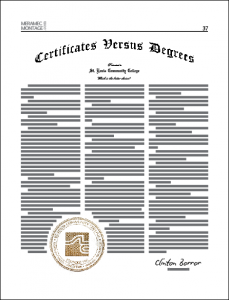The difference between certificates and degrees.

Clinton Borror
– Staff Writer –
In the world of community colleges, there are two routes for course completion certificates and associate degrees.
Certificates are for students wishing to update existing skills or apply a few specific learned skills to a specific area job.
Associate degrees are for students who wish to obtain a degree, or wish to transfer to a university.
Certificates take fewer credits for completion, but associate degrees earned at STLCC-Meramec exempt many course requirements when transferring to universities. Students who have earned an associate degree at STLCC and transfer to a state university are automatically considered juniors. “If someone has a degree and is coming back to school, they might learn a specific topic and focus just on that,” Manager of Admissions and Records Michael Cundiff said.
Certificates allow students to ignore the foundation level courses necessary for associate degrees.
There are Certificates of Proficiency and Certificates of Specialization. Certificates of Specialization require fewer credit hours to complete than Certificates of Proficiency, but both are focused on one field.
“A Certificate of Proficiency is designed to give up-to-date knowledge to an individual who has some knowledge in a particular area,” Mysha Clincy, academic advisor at Meramec, said.
Certificates are not designed for students who wish to transfer or earn a degree but for students seeking academic improvement, which would be useful for a specific job.
“In some instances there are jobs certificates are required for, but it also could be useful for an individual who is changing their current field,” Clincy said.
Certificates are made for a student who wishes to use them for a field he or she is currently working in or intends to work in.
“I want to make it clear that these are designed to assist individuals with some area of work,” Clincy said.
Certificates of Proficiency available at Meramec are: accounting, business administration, criminal justice, digital media -photography, digital media -world wide web, early care and education, fine arts studio, horticulture and information reporting –captioning.
Certificates of Specialization available at Meramec are: business administration, computer accounting Technology, digital media –digital photography, digital media –interactive, page layout –graphical design, digital media –video art, early care and education and horticulture.
The Digital Media Certificates of Specialization each require 17 credit hours.
“We get students who may already have a bachelor’s degree, that have been working in the media industry for several years and decide to come back to school to build their skill set,” Meramec’s Center for Visual Technology Faculty coordinator Timothy Linder said.
The low credit hour requirement of Digital Media certificates can be advantageous due to the constant advance of technology.
“The world of digital media changes so rapidly, you often have to go back and take courses to stay on top,” Linder said.
Digital Media certificates are often added to students’ resumes.
“Most jobs don’t have a specific certificate requirement,” Linder said. “They help them get in the door for the job.”
The Digital Media –Animation Certificate of Specialization can be useful in multiple fields.
“Animation is a really wide area that you can apply to different careers,” Digital Arts and Technology Alliance (DATA) administrative assistant Amiee Shank said. “It’s not just about video games.”
DATA is an organization which assists in funding Meramec’s visual technology related courses.
“If they’re going into interior design, animation is a good way to present floor plans, or present plans to clients,” Shank said. “If they’re going into landscape design, the tools of animation apply there.”
Certificates can make students valuable by teaching them valuable job skills quickly.
“Any time a candidate for a position can come forward and say, ‘I know how to do these things. I am familiar with a computer. I can learn new tools quickly,’ that is a huge plus,” Shank said.








